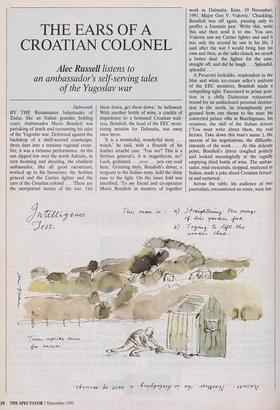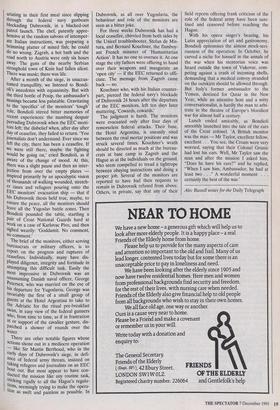THE EARS OF A CROATIAN COLONEL
Alec Russell listens to an ambassador's self-serving tales of the Yugoslav war
Dubrovnik BY THE Renaissance balustrades of Zadar, like an Italian grandee holding court, Ambassador Mario Bondioli was partaking of lunch and recounting his tales of the Yugoslav war. Delivered against the backdrop of a shell-scarred coastscape, three days into a tenuous regional cease- fire, it was a virtuoso performance. As the sun dipped low over the north Adriatic, in turn beaming and shouting, the ebullient ambassador, like all good raconteurs, worked up to his favourites: the Serbian general and the Cartier lighter and the ears of the Croatian colonel . . . 'These are the unreported stories of the war. Get them down, get them down,' he bellowed. With another bottle of wine, a crackle of impatience to a bemused Croatian wait- ress, Bondioli, the head of the EEC moni- toring mission for Dalmatia, was away once more.
`It is a wonderful, wonderful story . . . watch,' he said, with a flourish of his leather attaché case. 'You see? This is a Serbian general's, it is magnificent, no? Look, goddamit . . . ecco . . . you can read here.' Grinning shyly, Bondioli's driver, a sergeant in the Italian army, held the shiny case to the light. On the inner fold was inscribed, 'To my friend and co-operator Mario Bondioli in memory of together
work in Dalmatia. Knin. 19 November, 1991. Major Gen V. Vukovic.' Chuckling, Bondioli was off again, pausing only to proffer a fountain pen: `Write this, write this and then send it to me. You see, Vukovic saw my Cartier lighter and said it was only the second he saw in his life. I said after the war I would bring him his own and then, as the talks closed, we struck a better deal: the lighter for the case, straight off, and did he laugh . . . Splendid, splendid ..
A Pavarotti lookalike, resplendent in the blue and white ice-cream seller's uniform of the EEC monitors, Bondioli made a compelling sight. Ensconced in prime posi- tion in a chilly Dalmatian restaurant, bound for an undisclosed personal destina- tion in the north, he triumphantly pro- gressed from one theme to the next: his converted palace villa in Bocchignano, his retainers, the skill of the Italian drivers (`You must write about them, the real heroes. Take down this man's name.'), the success of his negotiations, the difficulty, intensity of the work . . . At this delicate point, Bondioli's driver coughed politely and looked meaningfully at the rapidly emptying third bottle of wine. The ambas- sador, mid-crescendo, stopped, muttered in Italian, made a joke about Croatian fettuci- ni and restarted.
Across the table, his audience of two journalists, encountered en route, were kik
uriating in their first meal since slipping through the federal navy gunboats blockading Dubrovnik, in a blacked-out Patrol launch. The chef, patently appre- hensive at the random salvoes of intemper- ate Italian instructions, was preparing a brimming platter of mixed fish; he could do no wrong. Zagreb, a hot bath and the road north to Austria were only six hours away. The guns of the nearby Serbian stronghold town of Knin had fallen silent. There was music; there was life.
After a month of the siege, in unaccus- tomed tranquillity, we listened to Bondi- oli's anecdotes with equanimity. But with the third bottle of Posip, the ambassador's musings became less palatable. Gravitating to the 'specifics' of the monitors' tough' role, Bondioli stirred bitter memories of recent experiences: the numbing despair Pervading Dubrovnik when the EEC moni- tors left; the disbelief when, after day after day of ceasefire, they failed to return. 'You journalists don't understand. Ever since we left the city, there has been a ceasefire. If We were still there, maybe the fighting would be going on,' cried Bondioli, as if aware of the change of mood. At this, there was a slight pause and then an inter- jection from over the empty plates inspired primarily by an apocalyptic vision of thousands of walking wounded, stretch- er cases and refugees pouring onto the EEC monitors' evacuation ship — that if his Dubrovnik thesis held true, maybe, to ensure the peace, all the monitors should leave all the Yugoslav battle zones. Then Bondioli pounded the table, startling a pair of Croat National Guards hard at work on a case of Karlovac Pivo, and then sighed wearily: `Goddamit. No comment, no comment.'
The brief of the monitors, either serving bureaucrats or military officers, is to report on the progress and ruptures of ceasefires. Individually, many have dis- Played diligence, integrity and fortitude in attempting this difficult task. Easily the most impressive in Dubrovnik was an unassuming Danish naval officer, George Peterseh, who was married on the eve of his departure for Yugoslavia. George was invariably the first of a small group of guests at the Hotel Argentina to take to the Adriatic for the ritual pre-breakfast swim, in easy view of the federal gunners who, from time to time, as if in frustration at or support of the cavalier gesture, dis- Patched a shower of rounds over the water.
There are other notable figures whose actions shone out in a mediocre operation like Sir Martin Berthoud, who in the early days of Dubrovnik's siege, in defi- ance of federal army threats, insisted on taking refugees and journalists on an EEC boat out. But most appear to have con- ducted the mission like any routine task, sticking rigidly to all the Hague's regula- tions, seemingly trying to make the opera- tion as swift and painless as possible. In Dubrovnik, as all over Yugoslavia, the behaviour and role of the monitors are seen as a bitter joke.
For three weeks Dubrovnik has had a local ceasefire, chivvied from both sides by the Unicef troubleshooter, Stefan de Mis- tura, and Bernard Kouchner, the flamboy- ant French minister of 'Humanitarian Action'. It has no one to oversee it. At one stage the city fathers were offering to hand over their weapons and inaugurate an `open city' — if the EEC returned to offi- ciate. The message from Zagreb came back — no.
Kouchner who, with his Italian counter- part, pierced the federal navy's blockade of Dubrovnik 24 hours after the departure of the EEC monitors, left ten days later muttering, 'Cowards, cowards.' The judgment is harsh. The monitors were evacuated only after four days of remorseless federal attacks. Their base, the Hotel Argentina, is uneasily sited between the rival mortar positions and was struck several times. Kouchner's wrath should be directed as much at the bureau- crats at base camp in Zagreb and the Hague as at the individuals on the ground, who seem compelled to tread a tightrope between obeying instructions and doing a proper job. Several of the monitors are reported to have had their requests to remain in Dubrovnik refused from above. Others, in private, say that any of their field reports offering frank criticism of the role of the federal army have been sani- tised and censored before reaching the Hague.
With his opera singer's bearing, his Latin appreciation of art and gastronomy, Bondioli epitomises the almost mock-seri- ousness of the operation. In October, he carved a niche for himself in the annals of the war when his stentorian voice was heard outside the town of Vukovar, com- peting against a crash of incoming shells, demanding that a medical convoy stranded on the outskirts should be allowed through. But Italy's former ambassador to the Yemen, destined for Qatar in the New Year, while an attentive host and a witty conversationalist, is hardly the man to arbi- trate in the theatre of Europe's bloodiest war for almost half a century.
Lunch ended amicably, as Bondioli smoothly launched into the tale of the ears of the Croat colonel. 'A British monitor was the man — Mr Taylor, excellent fellow, excellent ... You see, the Croats were very worried, saying that their Colonel Grunic had lost his ears. Well, Mr Taylor saw the man and after the mission I asked him, "Does he have his ears?" and he replied, "When I saw him, Ambassador, he had at least two . . ." A wonderful moment . . . certainly the best of the war.'
Alec Russell writes for the Daily Telegraph



























































 Previous page
Previous page